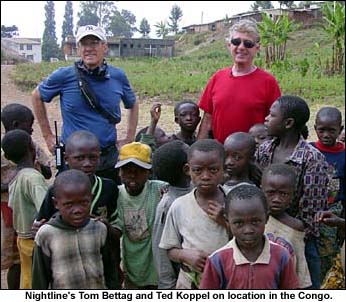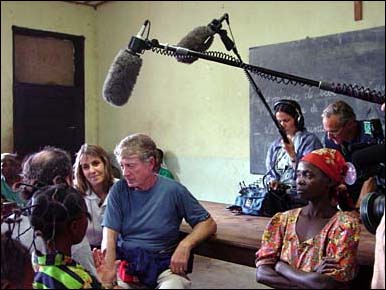Producer's
Journal By Tom Bettag
Executive Producer, ABC News Nightline
 In
July, Ted Koppel and seven other people from Nightline (including
two camera crews) went to the Democratic Republic of Congo to tell
the story of the incredible suffering from the civil war there. In
three years over two and a half million people have died as a result
of the fighting...from killing, disease and starvation. It is a story
very few have heard because it has been so dangerous for journalists
and aid workers. Three Red Cross workers were killed in the spring.
In
July, Ted Koppel and seven other people from Nightline (including
two camera crews) went to the Democratic Republic of Congo to tell
the story of the incredible suffering from the civil war there. In
three years over two and a half million people have died as a result
of the fighting...from killing, disease and starvation. It is a story
very few have heard because it has been so dangerous for journalists
and aid workers. Three Red Cross workers were killed in the spring.
We scheduled the series to air the second week of September, the week
of September 11. It took this long for news to slow down enough for
us to feel reasonably safe that the series could run without interuption
by major breaking news.
Day 1: Goma,
Eastern Congo
I had never been to Congo. My first impressions of the richest, most
dangerous, most tormented nation on earth were of the people.
Aid workers had talked about how they loved the Congolese. People
who walk all day to get to the market carrying enormous burdens on
their heads. Women with flowing fabrics in fantastic colors. Ted gave
half of his soda to a boy who was watching us tape. The boy carefully
shared it to the last drops with six other children. We asked whether
that could ever happen in the U.S.
Every country has its special form of transportation. Here it's a
scooter crafted entirely out of wood, down to its wheels. It's called
a chikudu. People will load them up with 600 pounds of corn or beans
and ride them at incredible speeds down mountain roads, with no brakes.
They'll deliver their goods, load up some provisions, and then spend
most of the day walking it up the mountain back home.
Day 2: Goma
Logistics, logistics...
We have two great cameramen with us, Alex Bruckner from Vienna and
James Mitchell from Johannesburg, South Africa. We bring a camera
from Washington for James so it will match the picture quality of
Alex's camera. That camera arrives and has an intermittent instability
in the picture. After hours on the cell phone with a great ABC technician
in London, we determine it can't be fixed here. There's nothing sadder
than a television news team without a camera.
We rush a London bureau producer to catch the last flight to Kampala,
Uganda with a replacement camera. A charter meets him at Entebbe airport
and brings him and the camera to Goma. Great cheers until we discover
that in the rush to get to the airport, there has been no time to
check out the camera. It has broken wires in the viewfinder.
This time we were able to repair it. It only took a good part of the
night for three ABC people and a technically brilliant cameraman staying
in our hotel from ITN's team.
Day 3: Goma
One huge impression: strong women.
The aid workers say the salvation of Congo is its women. I realize
that in duress all the essential chores fall to the women. I have
never seen so many women carrying staggering loads on their heads,
walking what passes for roads, on round trips to market that take
at least all day. And always with flashing eyes and magnificent smiles.
One of the memorable scenes was watching two women with gigantic loads
on their heads, and one with a baby on her back, look with fascination
at Franziska Neidhart rigging radio microphones for our crew. Francie
is probably 5'2" and 110 pounds, and pound for pound the strongest
person I know. She carries incredible loads, always with grace and
an indefatigable joy.
These were two women still in the Middle Ages looking at a 21st century
woman - all three titans.
One of my favorite sayings is: "Strong women fear nothing. Strong
men fear strong women." Appropriately so.
Day 4: Goma to Bukavu
Montezuma's revenge. This is the day to get sick. Almost everyone
is in some form of intestinal discomfort. One producer and our liaison
person from the World Food Program are hit very hard. Ted does two
interviews and then has to lie down and regain his strength before
he can go on.
We are all expected to come to a Fourth of July celebration given
by a wealthy businessman in Bukavu. Everyone in the team is too sick
or too exhausted. Rank has its privileges, so I as executive producer
get to go as representative of the group.
At first I was sorry we didn't have one of the cameramen there. There
were 400 people, 15 of them Americans, at a lawn party. Red, white
and blue everywhere, including hats. A fabulous Congolese band. I
say "at first," because I soon realized that even if we
had the pictures, it would be impossible to get anyone to understand.
You had to be there.
 Day
5: Bukavu, Eastern Congo
Day
5: Bukavu, Eastern Congo
It's unbelievable how hard these people work. We keep passing a spot
where men sit with small hammers breaking large rocks into small rocks,
perhaps three inches in diameter.
At the beginning of the day, they get five truckloads of stones. Four
or five men working steadily can get it done in about 10 hours. If
they are able to sell the small stones, they will split about $3.
To give you an idea of what money will buy, a bag of charcoal, the
size we are used to for our grills, costs about $5 - beyond the reach
of most Congolese.
Incredibly hard work.
Day 6: Bagira, Eastern Congo
It is terribly hard to find one's place in this country of such grinding
poverty. People work so hard for so little and we work so little for
so much.
We ate a good breakfast before leaving at 4:30 a.m. to go shooting.
We were on our feet all day, carrying lots of camera gear. I walked
up the mountain about two miles, shooting pictures of our subject.
The vans were waiting at the top when I arrived about 4 p.m. I was
tired and very hungry. I tried to duck under the dashboard as I wolfed
down a piece of bread, a small sausage and a Coke. I tried to keep
people from seeing me. They had no bread, no meat and of course, no
Coke.
Day 7: Kisangani, Eastern Congo
It's amazing how hot and humid a place can be. My wife is a Louisiana
Cajun and I thought I was pretty good at dealing with this kind of
weather. If a place could feel like malaria, it seems to me this is
what it would feel like. It becomes very important to cut back the
amount of shooting time. This really takes a toll on the crews. This
is Conrad's Heart of Darkness, the deepest the Belgians could cut
into the rain forest and establish a major city.
Day 8: Kisangani
We shot the sunrise over town today. Had to walk up 10 flights of
stairs in a building where the elevator hadn't worked for years. When
we got to the top we realized we still couldn't get on the roof. It
was 6 a.m.
Our driver simply knocked on the door of a friend, and we trooped
through a family's apartment before dawn, onto their balcony and up
onto the roof. They showed absolutely no sign of irritation. The Congolese
are amazingly patient and accommodating.
Shortly after the sun rises, everything becomes cloudy, even foggy,
as the night moisture burns off. Then, about 11 a.m., the sun cuts
through and you sweat buckets.

Day
9: Kisangani
It's amazing what strikes people as exotic. What could be more exotic
than the heart of the great Congo River, the world of Henry Stanley
and Joseph Conrad? We are staying at one of Kisangani's few functioning
hotels. Power and water are a sometimes thing. Hot water is something
to look forward to in another city. Today they were putting a fresh
coat of paint on the hotel sign: Palm Beach Hotel.
Before we left the hotel we met a group of Italians driving a Land
Rover equipped with every piece of equipment you could imagine. It
turned out they were making a cross-Africa drive; from Trieste, Italy
to Capetown, South Africa. They had made it to Kisangani in two months.
They wanted to drive from Kisangani to Goma - what was for us a 1
hour 45 minute flight. But there is no way to make that drive and
reasonably expect to avoid being killed by any one of four armies.
The war has cut through most of Central Africa - it is the First African
World War. Their only chance was to double back a long way and drive
the eastern coast line. War can really spoil a vacation.
Day
10: Kisangani
Just figured out something that had been puzzling me since we got
here. Everyone drives on the right hand side of the road, but the
steering wheel is on the right, as it is in countries where one drives
in the left lane. It turns out this is where Japanese cars go to die
- and in Japan they drive in the left lane.
The cars go from Japan, where they are maintained impeccably, to Dubai
in the United Arab Emirates, where they probably get a good workout.
When they are on their last legs, they find their way to Congo.
We are finished. Tired, but very pleased with what we've been able
to get. We now begin 36 hours of flying to get home to Washington.
By the time we hit Dulles, we'll probably look and feel like those
Congolese cars.
Day 11: Nairobi, Kenya
Life has a lovely way of putting you in your place.
Ted and I went to Kenyata Airport in Nairobi to catch a flight to
Amsterdam. As we were waiting at the ticket counter, a lovely family
from Los Angeles approached us. I believe they were originally from
Pakistan, but they were completely California.
The family were genuine fans of Nightline, people who watch the broadcast
most nights. The patriarch called over to the other members of the
family to meet us. They were delightful. Smiles all around. It was
good to see Americans, and the praise felt pretty good.
They asked us why we were in Nairobi. We explained that we had just
spent 10 days in Congo. The patriarch looked at us shaking his head
slightly. "You look like you've spent 10 days in Congo."
I guess we didn't look as good as we felt.